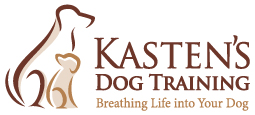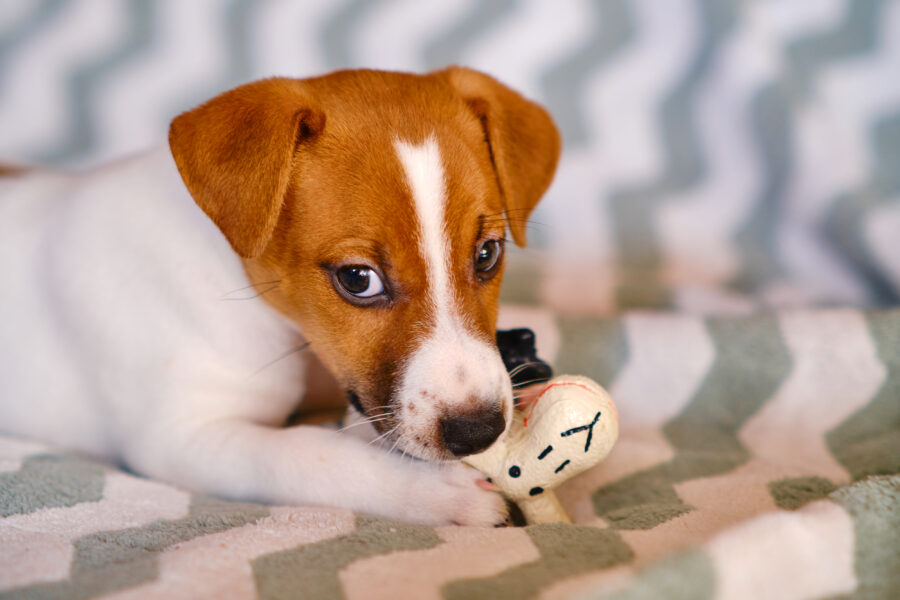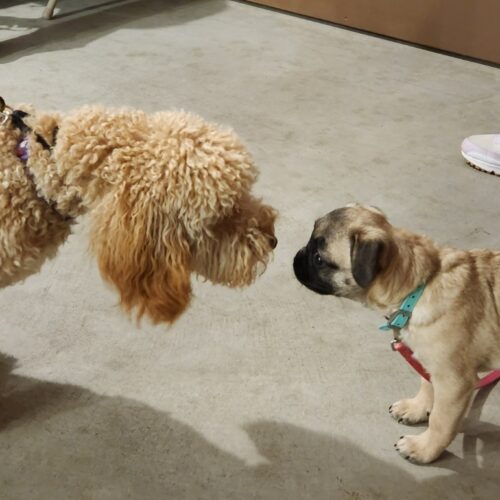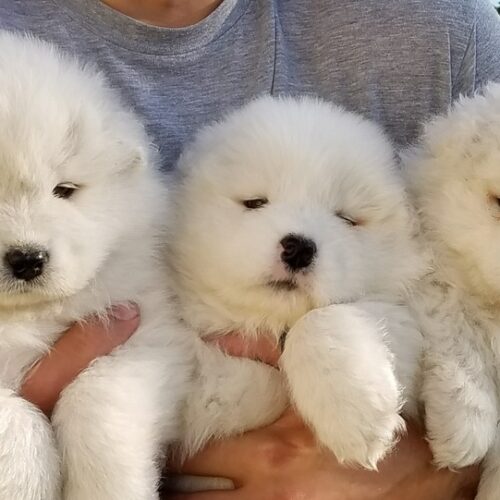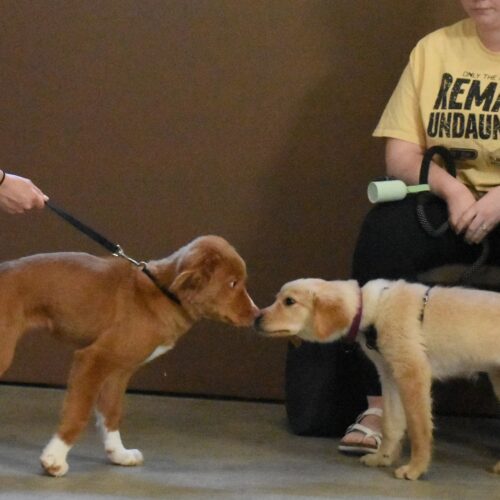Puppy teething can feel like a whirlwind of chewed furniture, lost baby teeth, and endless curiosity. One moment, your pup is calm; the next, they’re gnawing on the leg of your kitchen table. Understanding what’s normal and how to guide them through this stage is essential to raising a well-adjusted dog.
What is puppy teething, and when does it start?
Puppies begin teething around three weeks of age, but by the time they’re with their new family at eight weeks, the baby teeth are already in full force. These teeth are tiny, sharp, and designed to fall out as adult teeth push in around twelve to sixteen weeks.
From that point, your puppy’s mouth becomes a revolving door of lost teeth and inflamed gums until they’re about six or seven months old. It’s a normal, necessary stage, but it can be frustrating if you’re not prepared for the constant need to chew and the changes in behavior that come with it.
Why is my puppy chewing everything?
Chewing is your puppy’s built-in response to sore gums. It’s not defiance or destruction, it’s relief. When a puppy finds something that eases the pressure in their mouth, they’ll go back to it again and again. Unfortunately, that might be your chair leg, phone charger, or throw pillow.
The chewing also serves a mental purpose. It helps burn energy and gives your pup something to focus on during long days at home. If they don’t have an appropriate outlet, they’ll find one themselves, and that usually means trouble.
What’s normal and what’s not?
Most of what happens during teething is totally normal. You might see small spots of blood on toys, find baby teeth on the floor, or notice extra drooling. All of that comes with the territory.
What’s not normal is excessive bleeding, refusal to eat, or behavior that seems truly painful or aggressive. If your puppy is showing those signs, it’s time to call your vet and rule out infection or abnormal development.
Are nipping and biting part of teething?
Yes, but that doesn’t mean you should allow it. Puppies often nip more during teething because their mouth is sore and they want to engage. They use their teeth to explore the world, and that includes your hands, ankles, or whatever else is within reach.
This is when early boundaries matter. A teething puppy still needs to be taught that biting people in an intense or excessive manner is never appropriate. The behavior may be normal, but it shouldn’t be ignored. It needs to be addressed before it becomes an ingrained habit.
What kind of chews should I use?
Use chews that are firm but not rock-hard. If you can’t press your fingernail into it, it’s probably too hard for your puppy’s developing teeth. Choose rubber, nylon, or even frozen fabric-based toys that give some resistance without risking damage.
Rotate different textures and shapes to keep your puppy engaged. The novelty of a new chew can help redirect them away from destructive targets like furniture or baseboards. Always supervise when introducing something new.
What if my puppy is still chewing everything?
If your pup is ignoring the toys and still targeting your couch, you might have an outlet problem. They’re telling you they need more stimulation, more guidance, or both. Chewing isn’t always a physical thing; it’s often behavioral.
That’s where structure comes in. At Kasten’s Dog Training, we help families understand when to provide comfort, when to correct, and how to strike the balance that leads to calmer, more focused dogs. Some dogs need more than praise. They need direction with authority.
How do I discourage bad chewing?
You don’t just want to stop bad behavior; you want to replace it with something better. When your pup chews something off-limits, calmly interrupt the behavior and immediately redirect to an appropriate toy. Then praise or reward them for making the right choice.
Avoid shouting or chasing. That creates excitement and may turn the bad behavior into a game. Instead, be firm, be calm, and be consistent. If the behavior keeps repeating, it’s a sign the structure at home needs to tighten up.
Is puppy teething really a training issue?
It absolutely is. Teething isn’t just about teeth; it’s about impulse control. If you’re constantly chasing down chewed shoes or getting nipped during play, your puppy isn’t learning how to regulate their behavior. And that lack of control won’t magically disappear with age.
This is the perfect stage to teach your puppy how to live in your world. That means boundaries, consistency, and knowing when to guide gently and when to draw a clear line. Training is not a one-size-fits-all method. Some pups need redirection and rewards, while others respond better to firm consequences and structured routines.
Good Daily Habits
Every day, you should provide your puppy with both physical and mental outlets. A short training session in the morning, structured playtime, and consistent crate breaks help set expectations. That daily rhythm teaches your pup how to self-soothe and how to behave when no one’s looking.
Also, get hands-on with their mouth. Touch their gums, lift their lips, and make dental handling part of everyday life. This not only helps during teething, but it also prepares them for a lifetime of vet visits and brushing without drama.
When to Call a Trainer
Call a trainer when your puppy’s teething habits start turning into lasting behaviors. If you’ve tried redirection, toy rotation, and environmental management but nothing is sticking, you need more than a chew toy; you need a training strategy.
That’s what we deliver at Kasten’s. We design programs that match your dog’s temperament and your goals, not cookie-cutter scripts. Whether your puppy needs more engagement or more discipline, we’ll show you exactly how to bring out their best.
Ready to guide your puppy the right way?
Puppy teething is a stage, not a sentence. How you handle it determines whether your dog emerges with solid habits or lingering problems. You don’t need to settle for chewed furniture and bandaged fingers.
With the right plan and consistent leadership, your puppy can learn quickly and confidently. Kasten’s Dog Training is here to make sure that journey is clear, structured, and successful. Start now, and watch your puppy grow into the balanced, respectful companion you know they can be.
Contact Us Today!
At Kasten’s Dog Training, we remain committed to helping you and your dog build a strong, positive relationship through practical training. Visit our website or contact us today to learn more about our services so we can assist you in reaching your training goals!
